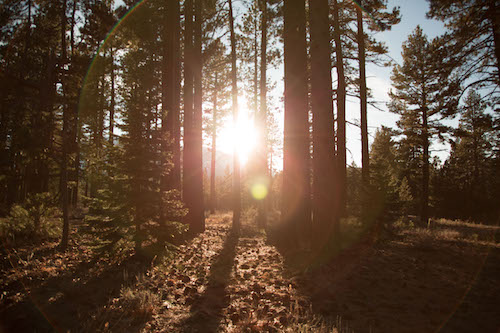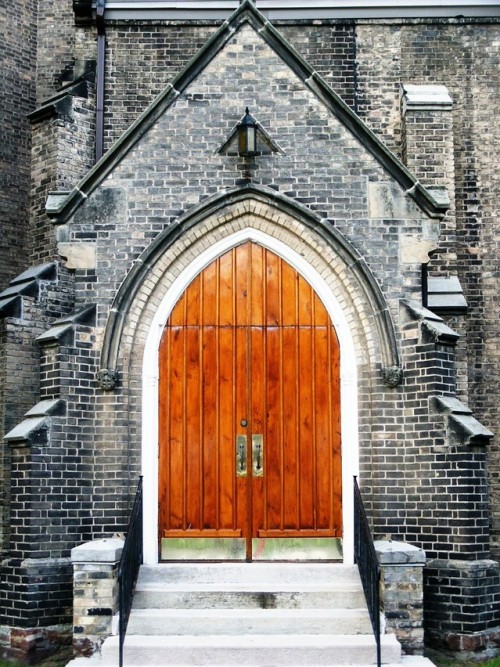There’s no easy way to access the woods behind my grandparent’s former home in suburban Philadelphia. But before my grandmother sold the house, I took one last rambling trip into the woods with my fiancée, Julie. She needed to see this place with me before we lost our access to it forever.
The stone steps that I used to tramp down were covered with dirt and leaves; no one had set foot on them in years. We wound our way through some overgrown bushes that had taken over the trail, and hit the old dirt bike track that a kid down the street used to zip around on all summer. In the winter that steep, narrow trail had been a kind of toboggan track. The steep starting point was made all the more exciting with the large bump toward the bottom that sent my plastic sled shooting into the air. The massive rocks that popped out here and there added to the excitement when we didn’t have enough snow.
We passed the massive tree that had fallen over and had served as the bench for countless teenagers who ventured into the woods at nighttime to make massive bonfires. In the morning I used to poke sticks around in the ashes they left behind.
 Looking up from the fallen tree, we could see the ridge line where my friend had seen a deer for the first time. Those woods were jam packed with deer, and hardly a day passed without seeing a few. He was maybe nine or ten years old, and as a child of the suburban edge of Philadelphia’s city limits, could only shout, “It has a tail!!!”
Looking up from the fallen tree, we could see the ridge line where my friend had seen a deer for the first time. Those woods were jam packed with deer, and hardly a day passed without seeing a few. He was maybe nine or ten years old, and as a child of the suburban edge of Philadelphia’s city limits, could only shout, “It has a tail!!!”
But nothing in these woods compared to its real treasure: the stream. It wasn’t much of a stream. It was hardly wider than 8 feet at most points, and who knows what kinds of pollutants had run off into it. But this stream, had always served as my main destination.
Along the shallow points I built bridges out of carefully piled rocks. Along the deep parts I skimmed pebbles. In the winter I slipped around on its smooth, icy surface with my wooden ice hockey stick and a hard rubber puck. Some days I even carried my hockey net down so that I could practice elevating the puck.
I don’t remember thinking all that much about those woods as a kid. I just remember being drawn to them every day. I never had to weigh whether or not I “wanted” to go into the woods by myself. If the weather was clear and I had the time, I typically headed down without a second thought.
I wish I could remember when I stopped going down into the woods. Something changed in me. As I grew up and “matured,” I lost sight of the freedom I found in the woods. I started thinking about it more. Going off into the woods suddenly felt a little riskier, even though I was far larger and stronger than I had ever been as an elementary school child.
At a certain point I stopped wandering in the woods. I never came close to rediscovering that desire to roam in the woods until going away to college. Perhaps the weight of guilt to pray more prompted me to take more walks in the woods, but soon the tiny patch of woods became a sanctuary of solitude again. When Julie and I returned home for that last visit in the woods behind my grandparents’ home a few years after graduating, I was finally remembering that something significant and sacred had taken place in those woods.
But concurrent with this realization, the path to those memories was becoming obscured and uncertain–like steps covered in leaves and dirt.
These days I feel a tiny tug to get better at seeking solitude, to love it the way that little boy loved venturing into the woods. My days are crammed with screens, conversations, and tasks. Somewhere deep within myself, I can sense a part of myself trying to find his way back into the woods. Something craves that solitude, to make it automatic and natural and to feel completely safe and at home in my own company apart from the noise and worries of life.
Was my time in the woods was just the product of youthful leisure? Or was it the purest expression of myself, now overgrown? Did I just go through a phase that is now dead and gone, or did my young mind try to set something in motion that I have needed so desperately as I enter middle age?
I like to think it was a divine mercy that prompted me to take that final trip into the woods with my future wife, and to mark off that place, in our shared memory, as something significant and worth sharing. If I have any hope of finding my true self, I suspect that it can be found wandering in my grandparents’ woods.








